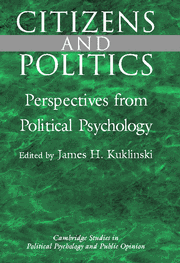Crossref Citations
This Book has been
cited by the following publications. This list is generated based on data provided by Crossref.
2003.
Faculty Forum.
Teaching of Psychology,
Vol. 30,
Issue. 2,
p.
131.
Caprara, Gian Vittorio
and
Zimbardo, Philip G.
2004.
Personalizing Politics: A Congruency Model of Political Preference..
American Psychologist,
Vol. 59,
Issue. 7,
p.
581.
Graber, Doris
2004.
Mediated Politics and Citizenship in the Twenty-First Century.
Annual Review of Psychology,
Vol. 55,
Issue. 1,
p.
545.
DRUCKMAN, JAMES N.
2004.
Political Preference Formation: Competition, Deliberation, and the (Ir)relevance of Framing Effects.
American Political Science Review,
Vol. 98,
Issue. 4,
p.
671.
Ryfe, David M.
2005.
DOES DELIBERATIVE DEMOCRACY WORK?.
Annual Review of Political Science,
Vol. 8,
Issue. 1,
p.
49.
Lau, Richard R.
Andersen, David J.
and
Redlawsk, David P.
2008.
An Exploration of Correct Voting in Recent U.S. Presidential Elections.
American Journal of Political Science,
Vol. 52,
Issue. 2,
p.
395.
Rosema, Martin
Jost, John T.
and
Stapel, Diederik A.
2008.
Applied Social Psychology.
p.
291.
Shapiro, Robert Y.
and
Bloch‐Elkon, Yaeli
2008.
DO THE FACTS SPEAK FOR THEMSELVES? PARTISAN DISAGREEMENT AS A CHALLENGE TO DEMOCRATIC COMPETENCE.
Critical Review,
Vol. 20,
Issue. 1-2,
p.
115.
Lupia, Arthur
Levine, Adam Levine S.
and
Zharinova, Natalia
2008.
When Should Political Scientists Use the Self-Confirming Equilibrium Concept? Benefits, Costs, and an Application to Jury Theorems.
SSRN Electronic Journal,
Ohl, Ricky
2008.
Knowledge Cartography.
p.
267.
Druckman, James N.
Kuklinski, James H.
and
Sigelman, Lee
2009.
The Unmet Potential of Interdisciplinary Research: Political Psychological Approaches to Voting and Public Opinion.
Political Behavior,
Vol. 31,
Issue. 4,
p.
485.
OBrien, Léan V.
and
McGarty, Craig
2009.
Political disagreement in intergroup terms: Contextual variation and the influence of power.
British Journal of Social Psychology,
Vol. 48,
Issue. 1,
p.
77.
Lupia, Arthur
Levine, Adam Seth
and
Zharinova, Natasha
2010.
When Should Political Scientists Use the Self-Confirming Equilibrium Concept? Benefits, Costs, and an Application to Jury Theorems.
Political Analysis,
Vol. 18,
Issue. 1,
p.
103.
Rankin, David M.
2010.
Processing the War in Iraq While Learning About American Politics.
Journal of Political Science Education,
Vol. 6,
Issue. 3,
p.
258.
Stern, Ithai
and
Westphal, James D.
2010.
Stealthy Footsteps to the Boardroom: Executives' Backgrounds, Sophisticated Interpersonal Influence Behavior, and Board Appointments.
Administrative Science Quarterly,
Vol. 55,
Issue. 2,
p.
278.
Huber, Sascha
2010.
Information – Wahrnehmung – Emotion.
p.
145.
Le Hay, Viviane
Vedel, Thierry
and
Chanvril, Flora
2011.
Usages des médias et politique : une écologie des pratiques informationnelles.
Réseaux,
Vol. n° 170,
Issue. 6,
p.
45.
Erişen, Cengiz
2013.
The Political Psychology of Turkish Political Behavior: Introduction by the Special Issue Editor.
Turkish Studies,
Vol. 14,
Issue. 1,
p.
1.
Tepe, Sultan
2013.
The perils of polarization and religious parties: the democratic challenges of political fragmentation in Israel and Turkey.
Democratization,
Vol. 20,
Issue. 5,
p.
831.
Wallace, Sophia J.
Zepeda‐Millán, Chris
and
Jones‐Correa, Michael
2014.
Spatial and Temporal Proximity: Examining the Effects of Protests on Political Attitudes.
American Journal of Political Science,
Vol. 58,
Issue. 2,
p.
433.



